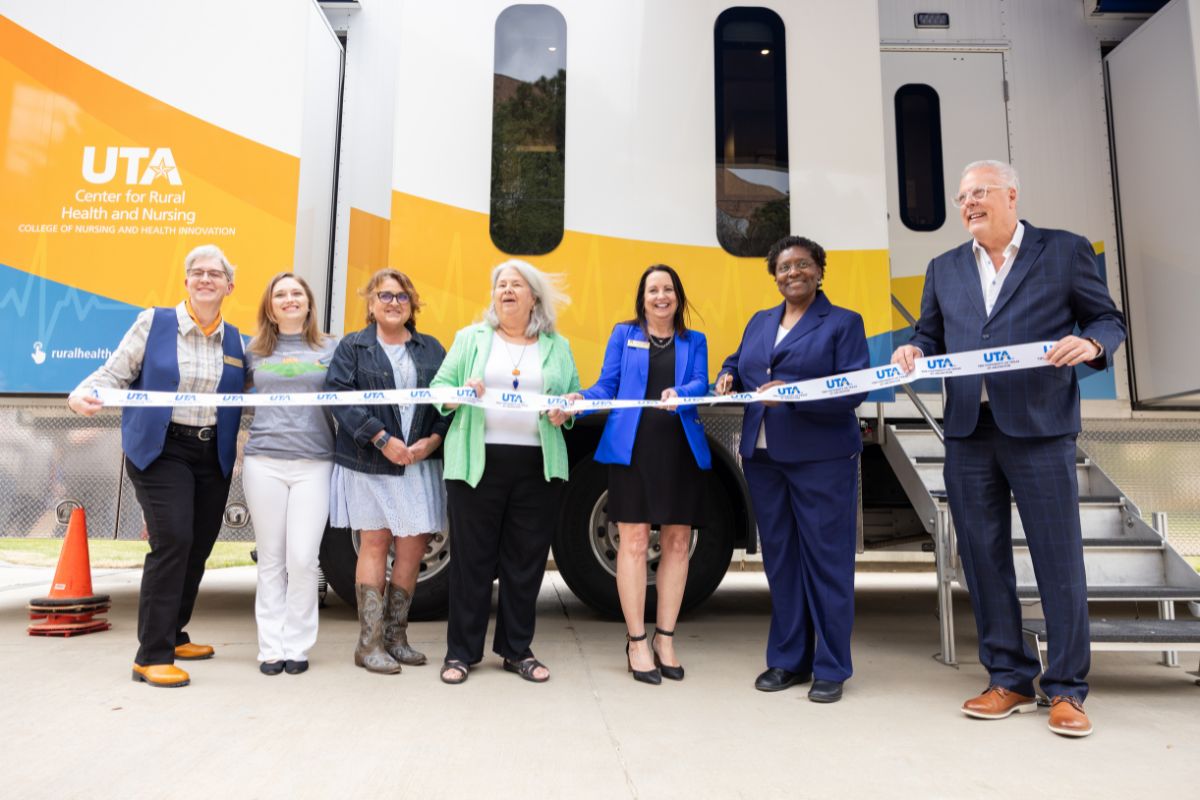UTA takes lead with mobile lab to address rural health care crisis
Monday, Mar 31, 2025 • Drew Davison : contact
Texas has the most rural residents of any state, with nearly 3 million people spread across a vast landscape. If rural Texas were its own state, it would rank as the 36th most populous.
Yet, rural Texans face significant barriers to health care that their urban counterparts do not. More than a quarter of the state’s 172 rural counties lack a hospital, and those with at least one hospital often struggle with a shortage of qualified health care personnel, such as nurses and first responders.
To address these growing challenges, The University of Texas at Arlington introduced its new Mobile Simulation Lab on Friday. It’s the first in Texas dedicated solely to rural training.
This educational milestone was celebrated at a launch party at UTA’s School of Social Work and Smart Hospital building. Officials from UTA, including President Jennifer Cowley, and Arlington Mayor Jim Ross attended.
“Today we’re not just unveiling a new resource—we’re making history,” Dr. Cowley said. “It’s a perfect reflection of what UTA 2030: Shared Dreams, Bright Future is all about. As a university, we are committed to student success, alumni and community engagement, and research and innovation.
“And y’all, this lab checks all those boxes.”
Related: UTA nursing is nation's first to use VR immersion room
Ross described the Mobile Simulation Lab’s mission as a “game-changer” for enhancing access to quality health care in the state’s rural communities.

The $1 million mobile unit, a 40-foot commercial vehicle, is equipped with three simulation bays and three advanced patient manikins, one of which simulates childbirth, including cesarean sections and other obstetric emergencies.
A lack of obstetrical services is one of the more pressing health care challenges in rural counties of the state. Fewer than half of Texas’ rural hospitals provide maternity care, leaving many rural residents without essential services.
“When it comes to obstetric or delivery emergencies, rural patients are at higher risk for poorer outcomes than their urban counterparts,” said Jennifer Roye, the assistant dean of simulation and technology at the College of Nursing and Health Innovation. “That is all the more reason to train those nurses out there on how to take care of emergency situations to save moms and save babies.”
Access to care continues to decline. In the 1960s, Texas’ rural counties had 300 hospitals, nearly double the number today. The past decade alone has seen more than 20 rural hospitals shut their doors.
By bringing advanced training directly to rural areas, UTA’s Mobile Simulation Lab will help local health care providers expand their expertise, enabling them to deliver essential care within their communities and reducing the need for costly travel to distant training centers.
Expanding the nursing workforce in rural areas is vital to improving the health of Texans statewide. Rural communities face higher rates of chronic illness and limited access to care, with heart disease, cancer, unintentional injury, chronic lower respiratory disease and stroke among the leading causes of death, according to the Centers for Disease Control.
“Investing in rural nursing education is an investment in the health and longevity of entire communities,” said Aspen Drude, manager for the Center for Rural Health and Nursing. “By equipping local providers and our UTA students with advanced skills, we not only improve patient outcomes but also strengthen the rural health care infrastructure that so many Texans rely on.”
Latest News
- Ice-T shares hard-earned wisdom with UTA studentsDuring a master class with students, the rap legend and TV star spoke candidly about humility, hustle and how he turned early struggles into success
- UTA's 23 patents strengthen UT System's No 3 rankingResearch contributions help boost the UT System’s position among the nation’s top innovators in patent technology
- UTA professor explores healing power of musicInspired by Alzheimer’s-stricken Glen Campbell, UT Arlington’s Rhonda Winegar explores how music therapy can support neurological care
- Drone duel puts UTA's UA tech to the testStudents from universities in three states faced off at Maverick Stadium in a competition focused on precision and innovation
- Ice-T brings his story to UTA’s Maverick Speakers SeriesThe iconic rapper, actor and author will discuss his rise from the streets to stardom
- Four UTA faculty named NAI Senior MembersNational Academy of Inventors recognizes their groundbreaking work in chemistry, engineering and health care






